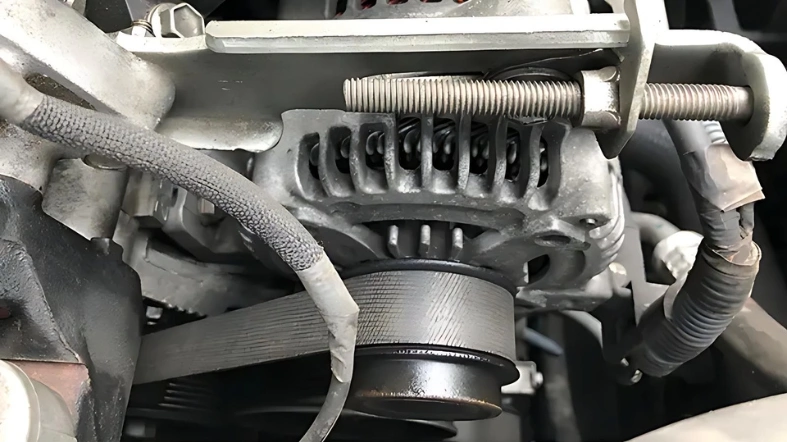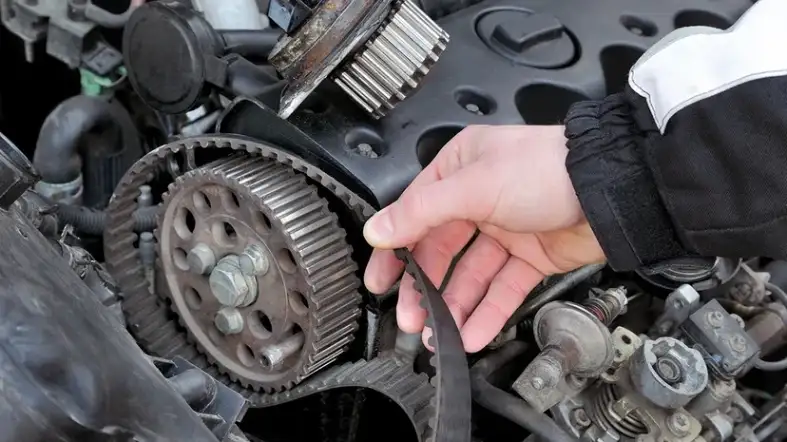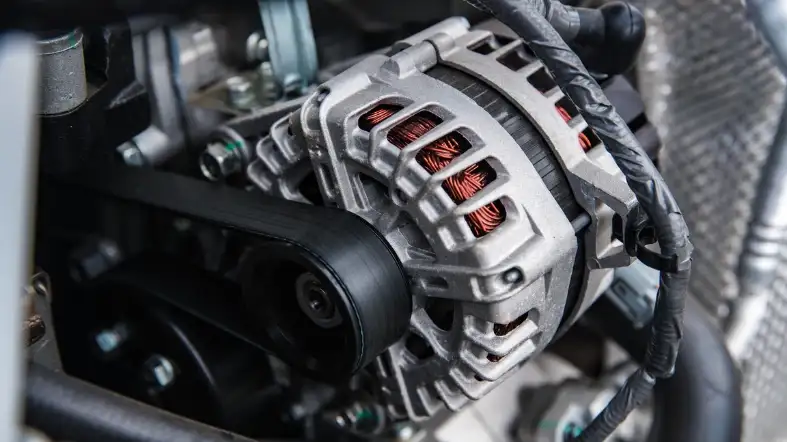Have you ever been driving down the road, minding your own business, only to have your car suddenly come to a grinding halt?
If so, you know just how frustrating and stressful it can be to deal with a car that won’t start.
But what if I told you that a bad starter could do more than just prevent your car from starting? What if I told you that it could actually kill your alternator too?
Yes, you read that right. If you’re not familiar with how these two components work together, don’t worry – we’ll break it all down for you in this blog.
Can a bad starter kill an alternator?
Yes, a bad starter can potentially damage an alternator. Let me explain in simple terms.

The starter and alternator are both important components of a car’s electrical system.
The starter is responsible for starting the engine, while the alternator charges the battery and powers the electrical systems of the car while it is running.
If the starter is faulty and doesn’t work properly, it can cause excessive strain on the alternator.
This is because when the starter is engaged, it draws a large amount of power from the battery, which puts a heavy load on the alternator to recharge the battery once the engine is running.
What are the signs that a bad starter kills an alternator?
A bad starter can indeed cause problems for your alternator, as the two components are closely related in how they function within your vehicle’s electrical system.
Here are some signs that a bad starter might be killing your alternator:
1. Difficulty starting the engine:
One of the most common signs of a bad starter is difficulty starting the engine.
When you try to start your vehicle, you may notice that the engine is slow to turn over or doesn’t start at all. This can be frustrating and could indicate a problem with your starter.
However, it’s important to note that a bad starter can also put extra strain on your alternator, which is responsible for charging the battery and providing electrical power to the vehicle.
The alternator works in conjunction with the starter to keep the engine running smoothly.
If the starter is faulty and not functioning properly, it may draw excessive power from the alternator, causing it to work harder than it should and potentially leading to premature alternator failure.
2. Electrical issues:
If you experience any electrical issues in your vehicle, such as dimming headlights, flickering dashboard lights, or other electrical problems, it could be a sign of bad starter.
The alternator plays a crucial role in supplying power to the electrical components of your car while also charging the battery.
However, if the starter is faulty and not operating correctly, it can put extra strain on the alternator. This added strain may cause the alternator to work harder than it should, leading to electrical issues in the vehicle.
Therefore, if you notice any abnormal electrical behavior, it’s important to consider the condition of both the starter and the alternator.
3. Battery issues:
A bad starter can also cause problems with your vehicle’s battery. If your battery is constantly dying or not holding a charge, it could be an indication that your starter is not functioning properly.
The starter relies on electrical power from the battery to initiate the engine’s ignition process. If the starter is faulty, it may draw excessive power from the battery, causing it to drain quickly or not hold a charge.
This, in turn, can put additional strain on the alternator. The alternator’s primary role is to replenish the battery’s power and keep it charged.
However, if the battery is constantly being drained due to a faulty starter, the alternator may have to work harder to compensate for the excessive power usage, potentially leading to alternator failure over time.
4. Grinding noises:
One telltale sign of a bad starter is a grinding noise when you try to start the engine. This grinding noise often indicates that the gears within the starter are worn out or misaligned.
If left unchecked, this issue can not only prevent the starter from functioning properly but can also cause damage to the alternator.
The grinding gears can generate excessive friction and heat, which can transfer to the alternator, potentially leading to its failure.
Therefore, if you hear any unusual grinding noises during the starting process, it’s essential to have both the starter and alternator inspected and repaired if necessary.
5. Smell of burning:
If you notice a burning smell coming from your vehicle’s engine compartment, it could be a sign that your alternator is overheating.
The alternator generates electrical power and is responsible for charging the battery while the engine is running.
However, if the starter is faulty, it can cause the alternator to work harder than it should. This increased workload can lead to excessive heat buildup within the alternator, resulting in overheating.
Over time, this overheating can cause damage to the alternator and ultimately lead to alternator failure.
If you detect a burning odor, it’s crucial to address the issue promptly by having both the starter and alternator inspected and repaired, if necessary, to prevent further damage to your vehicle’s electrical system.
How to prevent the damage of a bad starter from killing an alternator?

Here’s how to prevent a bad starter from damaging your alternator. Here are some points to keep in mind:
1. Understand what a starter and alternator do:
The starter is responsible for cranking the engine to start it, while the alternator is responsible for charging the battery and providing power to the electrical system while the engine is running.
They are two separate components that work together in the operation of your vehicle.
2. Recognize the signs of a bad starter:
If you notice that your engine is slow to start, or if you hear a grinding noise when you turn the key in the ignition, these are signs that your starter may be failing.
If you ignore these signs and continue to try to start your engine, you risk damaging the starter and potentially causing harm to other components.
3. Know the effects of a bad starter on the alternator:
When a starter is going bad, it can draw too much power from the battery and cause it to become drained.
This can then put extra strain on the alternator, which may try to compensate for the drained battery by working harder to recharge it.
Over time, this extra strain on the alternator can cause it to fail as well.
4. Take care of your battery:
One way to prevent damage to your alternator is to make sure your battery is in good condition.
If your battery is weak or failing, it can put extra strain on the alternator and make it more susceptible to damage.
Regularly testing and replacing your battery as needed can help keep your alternator in good shape.
5. Address starter issues promptly:
If you suspect that your starter is failing, it’s important to address the issue promptly before it causes further damage to other components.
Ignoring a bad starter can lead to more expensive repairs down the road, including alternator replacement.
6. Get regular maintenance:
Regular maintenance of your vehicle can help prevent issues with both your starter and alternator.
This includes things like checking and replacing belts, cleaning and tightening connections, and ensuring that all components are functioning properly.
How a Bad Starter Can Affect an Alternator?

When a car’s engine fails to start or starts with difficulty, it can cause various problems with the vehicle’s electrical system, including the alternator.
Here are a few ways in which a bad starter can affect an alternator:
1. Overloading:
When a car’s starter is damaged, it can draw excessive electrical current from the battery, which can cause an overload on the alternator.
This overload can damage the alternator’s internal components, such as the diodes, which can cause the alternator to fail.
2. Reduced charging capacity:
A bad starter can cause a decrease in the alternator’s charging capacity.
If the starter is not functioning properly, it may require more power from the battery to start the engine, leaving less power available for the alternator to charge the battery.
This can lead to a weak battery and a reduced charging capacity of the alternator.
3. Short-circuit:
A malfunctioning starter motor can cause a short circuit in the vehicle’s electrical system.
This short circuit can damage the alternator’s diodes, which can cause the alternator to fail.
Additionally, a short circuit can cause damage to other electrical components of the vehicle.
4. Frequent starting:
If the starter motor is damaged, the vehicle may require more frequent starting attempts to start the engine.
This can put additional stress on the alternator, as it has to work harder and for longer periods to recharge the battery.
This increased workload can cause the alternator to overheat and fail.
5. Belt damage:
The starter motor is connected to the alternator by a belt.
If the starter motor is faulty, it can cause the belt to slip or break, which can cause damage to the alternator pulley.
A damaged pulley can cause the belt to slip off, resulting in a loss of power to the alternator.
FAQs
Q. Can A Bad Battery Also Cause Problems With The Starter And Alternator?
A: Yes, a bad battery can also cause issues with the starter and alternator.
If the battery is old or weak, it won’t be able to provide enough power to the starter or alternator, which can cause both components to fail prematurely.
Q. Can You Replace The Starter Or Alternator Yourself?
A: It’s possible to replace the starter or alternator yourself, but it’s not recommended unless you have experience with car repairs.
Both components are important for the proper functioning of your car, and improper installation could cause further damage or even be dangerous.
It’s best to leave the job to a professional mechanic.
Q. How Can You Prevent Problems With The Starter And Alternator?
A: Regular maintenance is key to preventing problems with the starter and alternator.
Make sure your battery is in good condition, and have your car inspected by a mechanic regularly.
If you notice any unusual sounds or behavior from your car, have it checked out right away to prevent further damage?
Conclusion
A bad starter can indirectly lead to the failure of an alternator, but it is not a direct cause.
When a starter is malfunctioning, it may draw an excessive amount of power from the battery, causing it to weaken.
If the battery becomes weak and can no longer supply enough power to the alternator, the alternator will start to fail as well.
However, a bad starter alone cannot directly kill an alternator. Therefore, it is important to address any issues with your car’s starter as soon as possible to prevent any further damage to the alternator.
